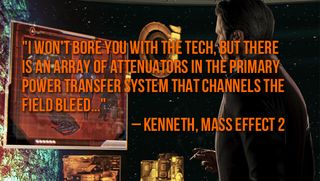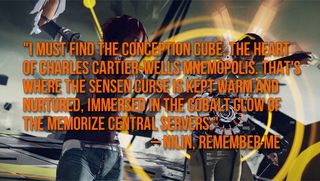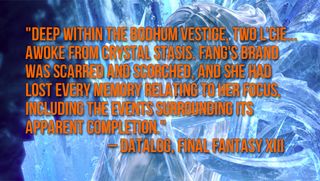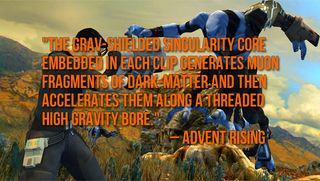How to use technobabble to make your game awesome

Bigger is better
Fact: Making games is super, crazy, ridiculously hard. I say that with all the authority of someone who's never made a game but read about it once, so you know my information is solid. I mean, it's bad enough you have to do all that programming and character modeling and paying people to test it--they should be paying you for getting to play it, amirite? Then if you want to add a story, you have to do it in a way that players can identify with, and that only gets ten-times harder when it's a sci-fi/fantasy game. You have to put in way too much work to create and explain a new world that makes sense to those needy bastards.
Or do you? There's a much easier way, one that lets you stuff plot gaps with cheap, easy filler: Technobabble. Defined as incomprehensible technical jargon, it confuses the player into believing what the game is trying to tell them, saving you tons of time and effort. (Though there is one other way to use it, which I guess I'll talk about later.) But what's the best way to use technobabble, and what can it do for you? Read on, and I will teach you all the ways!

Make your scientist characters sound super smart
It's common knowledge that science is completely incomprehensible to anyone without a Ph.D in quantum astro-genetiphysics. Therefore, anyone who can talk about the Calabi-Yau model and quantum entanglement like they actually know those are words is automatically going to look brilliant to your average player. You can use that to get your player to believe anything you want about the game world, because hey, the science-person said it, it must be true!
You can put the effort in to make your scientist's statement factually sound if you really want to, but it's not required. Just have them say the pseudo-organic cyborgs are linked by a centralized metaphysical pulmonary structure with spontaneous animation capabilities as if it were the most obvious thing in the world. Then players will fall for--I mean consider and accept that explanation after a thorough, reasoned analysis.

Make sure everyone realizes THIS IS THE FUTURE
We've all seen the Jetsons. We know how this future thing works. It's full of bizarre gadgets like flying cars and rocket boots that, while foreign to us, are so ubiquitous to our future children that they don't even bat a cybernetic eye over it. Want to show how futuristic your setting is? Not only does the protagonist have to take a teleporter to their job on Gliese 581B, they have to act like it's no big deal.
Nonchalantly referencing technologies that would make current humans' heads explode is a surefire way of showing just how future-y your futuristic game world is. Name-dropping monolithic companies or organizations works too, since both establish that the player is appropriately out of the loop. Plus, since the characters obviously know what all this stuff is, there's no need to explain it to the player! That's what I call efficiency.

Show how mystical your world is
On the other hand, say you don't want to establish how advanced your game world is, but how mythical and magical and possibly full of Leprechauns it happens to be. Making the player feel ignorant still works, just instead of referencing futuristic tech lingo you'll go for something that sounds more fantastical. It's still technobabble, but with a fantasy twist--mythobabble!
The nice thing about this strategy is that it comes with a built-in framework, and some key places to pull your fantasy gobble-dee-gook from. Your best bet is to make use of Gaelic-looking words, because everyone knows the Irish are magical faerie folk, though some unpronounceable Norse is good too. You get bonus points for every unnecessary apostrophe you add to the middle of a word, so make liberal use of those. Then just refer to back to barely-explained, universe-specific concepts, and voil! The player now has no idea what you're talking about, and can be led as you see fit. You're practically a wizard!

Confuse players into engaging by fudging the details
Sometimes you just really need to get the player to go from point A to point B with as little fuss as possible. You really, REALLY want them to go that ancient space jungle so they can luckily stumble on the secret tomb of Sorcha N Loingsigh and the Plot-Relevant Item of Plotness inside. Sadly, the player stubbornly wants an explanation for why they're going there and doing the thing. This is where technobabble is your savior: throw together an explanation that makes no sense but is convincingly stated, and they'll nod along so nobody realizes they don't get it. Job done!
This doesn't just work in specific scenarios, but can help bolster your plot as a whole. Need to establish why your enemies are so terrifying? Come up with a science-tastic explanation of how they use dark matter energy field-shaping powers to manipulate the universe. Holy crap, we've gotta kill these guys before they do--that thing anymore! Plot complete.

Make basic game mechanics sound cooler and more innovative
Games have some pretty basic building blocks that tend to show up again and again. Upgrades. On-screen feedback. Battle-hardened space marines with hearts of gold. None of these surprise players anymore, and they'll at best be neutral toward their inclusion in your game. They might even complain that these things showed up again, and hey, why don't you just make your OWN GAME THEN you programming wunderkind! Ahem. But one easy way to avoid all that is to call these common mechanics something different in your game--something cloaked in indecipherable tech-speak so no-one can tell it's already been done. Brilliant!
This one can be tough, since you should come up with a description that actually fits what the object does. But really, all that takes is a little creativity! Does the gun shoot things? Well, then it discharges a high-calefaction cordite-infused projectile designed to penetrate and suffuse through organic material for maximal corrosive effect. See? Doesn't that second one sound way more interesting and unprecedented? Yep, for this kind of technobabble, you're gonna be getting friendly with a thesaurus.

Hide that the writers have no idea what they're talking about
Theoretical physicist and professional smart guy Richard Feynman once said, "I think I can safely say that nobody understands quantum mechanics." What I'm getting from Mr. Brain here is that science is hard. That's good when it's too hard for players to understand and they can be bent to your will, but less good when you don't get it but still want to make your game seem sci-fi. Don't worry, my unintelligent friend, you can use technobabble to cover up how little you understand the material you're talking about.
Just as you can use big words to misdirect players into not questioning your plot, you can do the same to keep them from wondering about your expertise on any given subject. What, you think they're going to know there's no such thing as an inertial sponge, or that quarks have nothing to do with tracking signs of organic life? Just say it like you know what you're talking about, and they'll believe you. I've done it a hundred times in this article alo--I mean I am a total expert on everything I talk about. Yes.

Show that the writers know EXACTLY what they're talking about
So, let's say for gits and shiggles, you decided to put in the research to actually understand topics that come up in your game (weirdo). That takes a lot of time and a whole lot of thought-juice, so you want to make sure players understand just how much effort you put into getting it right. You could explain it in simple terms that anyone can understand, but screw that. That doesn't show how smart you are. Instead, make sure to throw in as many giant words as you can, all of which should make perfect sense to you and no sense to them. Yeah, who's the genius now?!!
While this way of using tech-jargon takes the most work on buy-in, that makes the tail-end of the process a whole lot easier. Instead of tossing darts at complicated terminology and seeing what sticks, you'll already know what these things mean, and can easily build long and involved explanations proving your intellectual superiority. You could also do it for love of the material, but why would you? I don't understand.

Poke fun at how ridiculous technobabble is
So we've established that some of you, for reasons that confuse everyone else, are genuinely interested in the subjects you include in your games. My guess is that you've been that annoying person who sees through brilliant technobabble at work, and has a laugh at the expense of folks trying to make a dishonest living. Shame on you.
But since you have a workable knowledge of the thing you're putting in your game, I guess you also get why this technobabble might be, you know, a tiny bit off. And that's how you can put it to work, too. With both specific expertise and genre-savviness in your mental utility belt, you can make these tropes as obvious as possible for humorous effect, instead of the other way around. A Fifteen Hundred Megawatt Heavy Duty Super-Colliding Super Button that's just a big red button? Well, I guess nerds like you will find that funny...

This confabulation's onlookers have arrived upon the terminal clause
I hope you were taking notes, because those are the best ways to use gaming technobabble for pleasure and profit. Learn anything new from this exercise? Got any tips and tricks of your own to share with your fellow jargon-masters? Are you just here to make fun of our brilliant technical gibberish? Wanna say that to my face? Well, you can say it to the comments instead--I DARE you.
Do you wish to partake of additional jargon-centered analyses? Direct your optical intake devices to Gaming's most ridiculous, made-up marketing terms and our lexicon of lackluster gaming terminology.

Former Associate Editor at GamesRadar, Ashley is now Lead Writer at Respawn working on Apex Legends. She's a lover of FPS titles, horror games, and stealth games. If you can see her, you're already dead.

Final Fantasy 7 Remake and Rebirth battle director says combining everything he learned on Monster Hunter: World with Square Enix's technology and unique skills created a "chemical reaction"

"Minutes after Palworld released," Pocketpair was already getting game pitches from "some really big names" before it even set up its own publisher: "No one has money at the moment"

Final Fantasy 7 Remake and Rebirth battle director says combining everything he learned on Monster Hunter: World with Square Enix's technology and unique skills created a "chemical reaction"

"Minutes after Palworld released," Pocketpair was already getting game pitches from "some really big names" before it even set up its own publisher: "No one has money at the moment"










